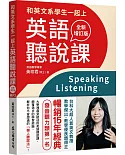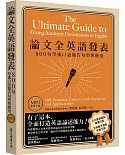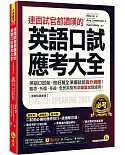這幾年寫了這麼多英文書,嘗試了多種學習方法,總覺得還少了點什麼。有次佳燕來美國找我時,談到近來學生雖然比較敢講英文,但在單字、時態和場合的運用上總是容易混淆不清,用語也不夠貼近現代外國人的用法。簡單來說就是不夠生活化。頓時腦中便浮現一個念頭:何不出幾本專門介紹生活化英文的書呢?於是「最易混淆的動詞」、「最常使用的短句」、「最易犯錯的句子」、「最常使用的單字」和「最不冷場的會話」便應運而生。
亞洲人學英文,總是侷限在文法要最正確,單字量要媲美GRE資料庫的迷思中;而且英文成績還要達到一定的程度下才敢開口說,卻忘了「生活化」才是最重要的關鍵。現在連美國人自己講話都務求精簡了,那種講求超完美文法的英文句實在沒必要。
英文短句就是要實用、簡潔,而本書教授短句的重點,可從以下三點著手:
1.認識這句話:每個短句的下面都有幫讀者規劃的使用頻率、使用情境(正式或非正式),以及使用的方式。
2.融入會話:光懂解釋還不夠,看看一般外國人會在哪種場合下說這句話。每段模擬對話下還會附註使用重點 (Point)。最後還附贈另一實用的短句,讓你多學一句可以臭屁的話。
3.實地運用:學會了短句後,記得找機會和外國朋友聊天或msn,現學現賣!
很感謝我識出版社又再次給我「嘗新」的機會,讓我跟佳燕的構想得以實現。也多虧蔣先生和毓芳提出「隨身讀」的概念,讀者們才得以見到今日小巧可愛的小書樣貌。
蔣志榆in S.F
2006 / 3 / 1
I don’t usually read this part of the book that you see in front of you. But I want to thank you for picking this book up and doing so. Of so many books out there you chose this one to
read. You should thank yourself now, as you did what many refuse to do,taking the first steps to learning a better English.
Passion is always a plus when trying to learn something, but you lack passion but have the will,you are still off to a great start. After I realized that I was interested in the English
language I began improving my English through different ways such as speaking with an English native speaker,watching movies, and what ever kinds of English reading material I could lay my
hands on. Further more,before a person can speak English well, you need to provide yourself with sufficient knowledge of the language,such as grammar,vocabularies,and different expressions
and so on.
When you have picked up this book,it means you have acquired the basic motives of learning English well. Now all you need is a tool to guide you in the right direction.
Sometimes you find yourself in a situation where even though you have a great grammar foundation and strong vocabulary list yet you are unable to express yourself with a native sounding
English. This book is going to teach you how under different circumstances, how a native sounding conversation would go about. For example, when you hear someone say something positive
happened to him or her, how do you return his or her enthusiasm? Or when they have expressed a thought in which you strongly agree with,how do you let him or her know that you feel the same
way?When you have fully understood the different uses, yo,ll realize that your conversation in English will no longer be stale and will have a much better expression of how you are feeling at
the time.
吳佳燕 in S.F
2006 / 3 / 13
Too many people are learning English against their will. I recall as I was growing up the English language was forced upon me through schoolwork and pressure from my parents. I was young
and playful, I was thinking about the swings and ice cream so what were my natural inclinations to all that language nonsense? I rejected.
However I found myself at disbelief when I all of a sudden started understanding what all the foreign kids were talking about. What has happened? Did I all of a sudden get bumped in the
head when I fell of a swing and became a genius?My mom says no way and starts to laugh at me. I realized later on that what had took place was me being in a foreign land,playing with foreign
kids,and eating MacDonald,s (not really),has naturally spawned my will to understand this foreign language.
So what can you do if you don,t have foreign kids to play with and does not live on a foreign land where English is the mother language? You strive to pick up English where you can see it
and hear it. In movie,on TVs,in readings, on the street, in your everyday environment, you ask when you don,t understand,and you speak when you know it. Don,t be afraid of the language and
don,t be embarrassed if you don,t say it right. Did Franklin say he failed at making the light bulb hundreds of times? No, he simply knew then, hundreds of times ways not to make a light
bulb. So open yourself to criticism,because it,s good for you.
And you can start your English learning journey with this book by knowing the many useful sentence structures in the office and everyday life. Learn the common phrases and go over the
example sentences and learn to recognize it and use it when you have the chance. Don,t worry if you come across a vocabulary that you have yet to learn, there,s a section in every chapter
dedicated to the vocabularies in the conversation.
Do you come across times when you need to introduce people at the office in the English language?
Would you like to show a foreign guest around office but don,t know what to say?
And what kind of conversation goes on when you show your foreign guest around town?
This book is especially great if your work involves guests who speak English or if you would like knowing what an everyday conversation at the office in English would be like. This book
will take you around the office and help you get started for speaking English inside the office and out
陳士傑 in S.F
2006 / 03 / 30































